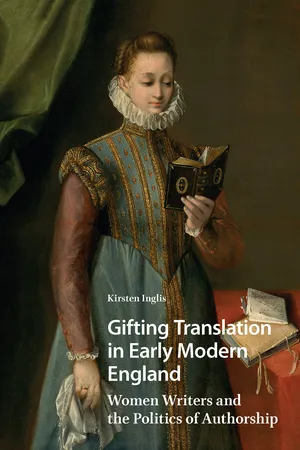
Gifting Translation in Early Modern England
Women Writers and the Politics of Authorship
- English
- ePUB (mobile friendly)
- Available on iOS & Android
Gifting Translation in Early Modern England
Women Writers and the Politics of Authorship
About this book
Translation was a critical mode of discourse for early modern writers. Gifting Translation in Early Modern England: Women Writers and the Politics of Authorship examines the intersection of translation and the culture of gift-giving in early modern England, arguing that this intersection allowed women to subvert dominant modes of discourse through acts of linguistic and inter-semiotic translation and conventions of gifting. The book considers four early modern translators: Mary Bassett, Jane Lumley, Jane Seager, and Esther Inglis. These women negotiate the rhetorics of translation and gift-culture in order to articulate political and religious affiliations and beliefs in their carefully crafted manuscript gift-books. This book offers a critical lens through which to read early modern translations in relation to the materiality of early modern gift culture.
Frequently asked questions
- Essential is ideal for learners and professionals who enjoy exploring a wide range of subjects. Access the Essential Library with 800,000+ trusted titles and best-sellers across business, personal growth, and the humanities. Includes unlimited reading time and Standard Read Aloud voice.
- Complete: Perfect for advanced learners and researchers needing full, unrestricted access. Unlock 1.4M+ books across hundreds of subjects, including academic and specialized titles. The Complete Plan also includes advanced features like Premium Read Aloud and Research Assistant.
Please note we cannot support devices running on iOS 13 and Android 7 or earlier. Learn more about using the app.
Information
Table of contents
- Cover Page
- Half Title page
- Title Page
- Copyright Page
- Contents
- List of Illustrations
- Acknowledgments
- Introduction: ‘Transformance’: Renaissance Women’s Translation and the Performance of Gift Exchange
- 1 ‘Thys my poore labor to present’: Mary Bassett's Translation of Eusebius's Ecclesiastical History
- 2 ‘For the comodite of my countrie’: Nation, Gift, and Family in Lady Jane Lumley’s Tragedie of Iphigeneia
- 3 ‘Graced both with my pen and pencell’: Prophecy and Politics in Jane Seager’s Divine Prophecies of the Ten Sibills
- 4 ‘The fruits of my pen’: Esther Inglis's Translation of Georgette de Montenay's Emblemes ou Devises Chrestiennes
- Conclusion: ‘Shall I Apologize Translation?’
- General Bibliography
- Appendix 1: Table of Emblems and Dedicatees in Esther Inglis’s Cinquante Emblemes Chrestiens (1624)
- Index